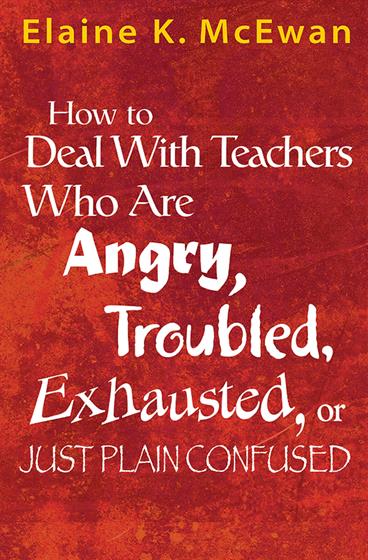Preface
Who This Book Is For
Special Features of the Book
Overview of the Contents
A Matter of Definition
A Cautionary Note
Acknowledgments
About the Author
1. Seven Habits of Highly Effective Principals: How to Deal With Difficult Teachers
Seven Habits for Dealing Positively With Difficult Teachers
Summing Up
2. How to Conduct an Assertive Intervention: Tell It Like It Is
The Critical Attributes of Assertive Intervention
The Three Stages of Assertive Intervention
How to Conduct Assertive Intervention
Summing Up
3. Strategies for Dealing With Angry, Hostile, or Just Plain Tiresome Teachers
Understanding Angry Teachers
What Works and What Doesn't?
Kinds of Angry Teachers
How to Deal With Angry Teachers
A Case Study: The Critical and Mean-Spirited Teacher
Summing Up
4. Strategies for Dealing With Teachers Who Are Temporarily Troubled, Mentally Disordered, or Are in Trouble With the Law
Characteristics of Teachers Who Are Temporarily Troubled
Characteristics of Teachers With Mental Disorders
Characteristics of Teachers Who Are in Trouble With the Law
How to Deal With Teachers Who Are Temporarily Troubled
How to Deal With Teachers Who Have Mental Disorders
How to Deal With Teachers Who Are in Trouble With the Law
Summing Up
5. Strategies for Dealing With Teachers Who Are Exhausted, Stressed, or Burned Out
A Principal's Perspective
Sources of Energy
Factors That Sap Personal Energy
Characteristics of Exhausted Teachers
How Administrators Sap Their Teachers' Energies
How to Deal With an Exhausted School
Summing Up
6.Strategies for Dealing With Teachers Who Are Confused, Marginal, or Just Plain Incompetent
Characteristics of Instructionally Challenged Teachers
How to Deal With Instructionally Challenged Teachers
Summing Up
7. Sixty Ways to Affirm, Energize, and Empower Teachers
Conclusion
Resource A: The Communicator's A-Z Handbook
Resource B: The Culture-Builder's Toolkit
References
Index



